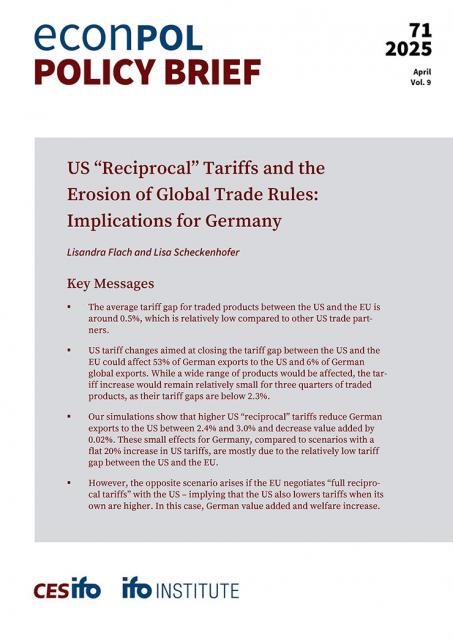News Archive

Why a More Decentralized Federal State Would Be Beneficial for the EU
|
EconPol Forum
| News
Russia’s attack on Ukraine has revealed the need to reassess Europe’s security. Currently, the European Union is a politically fragmented and divided union of member states, economically underperforming, with a defense capability that is insufficient without the support of the USA. This article of EconPol Forum argues that the European Union should develop towards a stronger decentralized federation, but by restoring the principle of subsidiarity.

The Impact of Sanctions on the Russian Economy
|
Policy Report
| News
Despite EU restrictions, only around one-third of pre-war exports to Russia are fully sanctioned; most trade remains unaffected or subject to numerous exemptions. While exports have decreased by 32%, imports have increased by 17% due to innovative ways to bypass trade sanctions. China is Russia’s most important alternative country of origin for products under sanction: 61 percent of all products subject to sanctions come from China. The Russian economy shows signs of recovery, driven by robust domestic demand from wartime fiscal stimulus, contributing about 10% to GDP in 2022-23.

Defence Spending in Europe
|
Policy Report
| News
To improve defence capabilities, Europe has to increase defence spending immediately and also to create fiscal space for a permanent rise in defence spending. Many European countries have collected a considerable peace dividend since the end of the Cold War. In the same period, welfare states have expanded to a degree not backed by the general economic development. This Policy Report shows that if European NATO countries shifted around one percent of non-defence expenditure towards defence, this would be sufficient to meet the NATO 2%-target.

EconPol Newsletter: Geoeconomics and the Green Transition
|
Newsletter
| News
The last EconPol Newsletter of 2023 has just been published. This issue features a special Policy Report on Geoeconomics analyzing different scenarios for the EU's future trade policy, a review of our 2023 EconPol Annual Conference in Brussels, as well as the latest EconPol Forum on how to make the green transition finally happen.

Trade Policy Scenarios for Europe's Economy
|
Polilcy Report
| News
Recent events and rising geopolitical tensions have raised concerns about the external dependence and vulnerability of Europe’s economy. A division of the global economy into geopolitical blocs would hit European pharmaceutical manufacturers, automotive manufacturers and suppliers, and manufacturers of machinery and equipment particularly hard. This is the finding of a new EconPol Policy Report.
